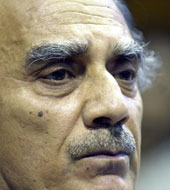|
|
| THE HEAT IS ON: Arun Shourie |
 |
| The Tulip Star |
 |
| Ajit Kerkar |
The six-acre, 371-room, sea-facing Tulip Star in Mumbai’s Juhu isn’t the best five-star hotel in town ? not by a long shot. In an unabashed, lyrical plug for it, a travel website says The Tulip Star “rises sphinx-like from the golden sands of Mumbai’s famous Juhu Beach and nestles strategically between the city and the commercial belt of the suburbs”.
Sphinx-like? That description seems to be just the sort of hook you might want to put out for tourists keen to come and discover the deep and hidden mysteries of the Orient. But if you have been reading the newspapers this past week, you can’t help but feel that the tag is more than ironic.
The Tulip Star (formerly known as the Juhu Centaur) has shuttered its doors for the past two months, laid off employees and defaulted on loan repayments even as owner Ajit Kerkar is closeted in negotiations with a group of investors to sell the hotel at a reported price of Rs 370 crore.
But that isn’t all: the hotel is at the centre of a raging battle being played out in Delhi’s Raisina Hill where finance minister P. Chidambaram and a gaggle of leftist parliamentarians are out to uncover the shenanigans in the selloff process that the previous Vajpayee government had initiated just over three years ago.
The dust-up between the political rivals began soon after the Congress-led United Progressive Alliance government assumed office in May 2004. The Left ? fiery detractors of the process of privatising state-owned enterprises ? had forced the Manmohan Singh government to soft-pedal the disinvestment process. After persuading the government to wind up the disinvestment ministry and bring it under Chidambaram’s finance ministry as a mere department, the Left has raised a clamour to investigate several selloff deals of the Vajpayee government.
| CHARGES AGAINST SHOURIE |
| • Shourie as disinvestment minister in the NDA government accepted a bid for Juhu Centaur from Ajit Kerkar-owned Tulip Hospitality Services Pvt. Ltd in November 2001 when the company did not have the money to pay for it. Tulip Hospitality had a paid-up capital base of just Rs 2,000 but it had put in a Rs 153 crore bid for the hotel without enough financial backing • Kerkar was a director on the board of Air-India which owned Hotel Corporation of India (the ultimate owner of the Juhu Centaur). Kerkar was on a sub-committee formed by the Air-India board which recommended the sale of the hotel. The day after Air-India passed the deal, Kerkar quit the airline’s board. Was there a conflict of interest: could Kerkar be a seller and a buyer? • Tulip was supposed to pay the sum by December 22, 2001 but failed. Shourie gave Kerkar’s company three extensions before finally receiving the amount on March 10, 2002. This was completely against the rules; no other bidder in the NDA’s selloff process had been extended such a benefit • Tulip’s original financial backer was an unnamed banker based on a North Pacific island. When it backed out, Shourie arranged meetings with a consortium of Indian banks in February 2002 and made sure they gave Kerkar a loan of Rs 129 crore to bale him out. • Tulip was the only bidder left in the fray after three bidders were disqualified and 16 others withdrew. There was no audit to determine why these bidders dropped out. • Tulip had deposited a bank guarantee for Rs 5 crore with the government but it was never encashed even though Kerkar defaulted on several deadlines. • The Juhu Centaur was undervalued for the sale. Jardine Fleming, the global advisor to the selloff, used the discounted cash flow method to arrive at a valuation of between Rs 81.70 crore and Rs 121.60 crore. The reserve price for the sale was fixed at a median price of Rs 101.60 crore. |
Disinvestment debate
The Left has made no bones about its resolve to scupper the process of disinvestment. It persuaded the Congress to state categorically in the common minimum programme that it would not privatise profit-making public sector companies. In the case of other state-owned companies, it would consider proposals to rehabilitate them first and a selloff would be considered only as a last resort. The Congress played along; it had no choice.
But the Left then went on to adopt a brilliant strategy: it started questioning the old deals of the NDA government and increasingly began to focus on the Juhu Centaur deal where they found some irregularities. This achieved a larger objective: it put pressure on the Manmohan Singh government to go slow on outright sale of its shareholdings in state-owned companies to strategic investors.
The whole drama over the Juhu Centaur selloff hangs between two dates: July 13, 2004 and May 4, 2005.
Dipankar Mukherjee of the CPI(M) raised an unstarred question in the Rajya Sabha on July 13 last year where he wanted to know from civil aviation minister Praful Patel whether the government was aware of the CAG report of 2003 which had “found a loss of Rs 145 crore in the revenue in the course of the sale of Centaur Hotel Mumbai of Hotel Corporation of India”. He also wanted to know whether the government was prepared to order an investigation in the light of the irregularities in the sale and the parliamentary standing committee’s report which had recommended an enquiry by the Central Vigilance Commission (CVC).
Patel fobbed him off with a one-line reply: “The government has taken a view that there was no need for an enquiry in this regard.”
But almost 10 months later on May 4, 2005, when Basudev Acharya of the CPI(M) raised a calling-attention motion on the same issue, he got a completely different reply from finance minister P. Chidambaram.
Chidambaram indicated in Parliament that something was sorely amiss with the selloff of Juhu Centaur, which was earlier owned by Hotel Corporation of India, an Air-India subsidiary. He said former disinvestment minister Arun Shourie had taken an “active interest” in shepherding the deal. He said he would wait till the CAG submitted its report for 2004 before deciding whether or not to order the enquiry.
Point counterpoint
So, what had changed between July 13, 2004 and May 4 this year? With the government aggressively pushing its reforms agenda, especially in the areas of banking and pensions, it had to carry the Left along. What could it possibly offer as blandishments to the Left? Just two things: an offer to maintain the interest rate on employee provident fund at 9.5 per cent (which it did for 2004-05) and halt the selloff process.
But the Congress also had its own motivations: it wanted to keep the heat on the Opposition. It had already targeted George Fernandes over his defence deals. Now it had a lot of dirt on another minister in the NDA government: Arun Shourie.
Shourie denounced the charge and demanded a public disclosure of the CAG report which was tabled in the House on May 6. Since then, the war of words has just escalated: the saffron brigade has denounced the witchhunt by the UPA government and challenged the government to order a probe. Chidambaram picked up the gauntlet on Friday by ordering an investigation.
| SHOURIE’S DEFENCE |
| • Nothing malafide in the deal. The reserve price was Rs 101.60 crore; the government secured a price of Rs 153 crore, which is 50 per cent higher • Shourie met Ajit Kerkar and a consortium of bankers in February 2002 to ensure that he could come up with the money. Denies he instructed the bankers to finance Kerkar • There can be no ‘consensus’ on selloff valuations; every valuation method is based on a set of assumptions that can be questioned • Denounces the UPA government for politicising the deal; says his critics had been contending that the Juhu Centaur was initially valued at Rs 246 crore and this was scaled down to Rs 101.60 crore. Says the Rs 246-crore valuation figure finds no mention in the CAG report and was a bogus figure floated to spark off a controversy • Ready to face a full investigation into the Juhu deal. |
The charge against Shourie is that he bent the rules and gave Tulip Hospitality’s owner Ajit Kerkar three extensions to cough up the money for the Juhu Centaur after his bid was accepted in November 2001. Moreover, he did not check to see whether Kerkar had adequate financial backing.
The other charge is that Shourie went out of his way to not encash the bank guarantee of Rs 5 crore that Kerkar had submitted with his financial bid when he repeatedly failed deadlines and did not even charge Kerkar any interest on the delayed payment which would have worked out to Rs 3.12 crore.
Shourie, in his defence, has argued that the CAG report has focused on just a few ‘technicalities’. He has maintained that far from helping Kerkar arrange the cash for the buyout, he was ascertaining whether Tulip Hospitality could close the deal. The government, he said, did not want to lose out on the money.
Very few believe that Shourie did anything for personal gain. Clearly, the man was under pressure to meet the stiff targets that the Vajpayee government had set to raise cash from its selloff programme.
In 2001-02, the NDA government had intended to raise Rs 12,000 crore from the sale of public sector units: it ended up raising just Rs 5,000 crore. All through the years in power, the Vajpayee regime had seen disinvestment as a major source of cash for the government ? which would be used to pare its mammoth fiscal deficit. It had pitched up its cash-raising target from the selloffs from Rs 10,000 crore in 2000-01 to Rs 13,200 crore in 2003-04 (its final year in power). It could never achieve those targets except for the year 2003-04 when it raised Rs 14,500 crore.
Through all the raging debate, Ajit Baburao Kerkar has maintained a stoic silence. The famed Tata satrap was turfed out of the group after a bitter power struggle with chairman Ratan Tata in August 1997. J.R.D. Tata had given Kerkar charge of a shoddily-run hotel and he quickly transformed it into the famed Taj group of hotels.
The Left MPs like Mukherjee and Acharya have focused on the fact that Kerkar was a director on the board of Air-India in 1998 and became a part of the sub-committee that advised on the selloff of the two Centaur hotels in Mumbai that were owned by Hotel Corporation of India (HCI). Intriguingly, on the day after the Air-India board accepted the sub-committee’s recommendation, Kerkar ceased to be a director. Although it was three years before Kerkar actually put in a financial bid for the Juhu Centaur, the detractors from the Left have wondered whether there was something more than met the eye. If you extended the logic ? and this could sound pretty spooky ? was Kerkar a buyer and a seller at the same time?
Question hour
The suddenness of the manner in which the issue has taken centrestage may or may not have something to do with the fact that Kerkar has reportedly started talks with a consortium of builders ? Nirmal Lifestyle, Oberoi Constructions and Vinod Goenka of the Conwood group ? to sell the hotel. Last month, Vijaya Bank had issued a public notice saying that it would oppose the sale because Kerkar’s Tulip Hospitality had defaulted on a quarterly loan repayment.
| NEXT STEP |
| Chidambaram has ordered an investigation but has not named the government agency which will carry it out |
Tantalising questions now hang in the air. Will the CBI or CVC investigate the deal? Already, the Left is ratcheting up its demand for investigations into the Balco and Jessop selloff deals. Will the Manmohan Singh government cave in to the pressure? Will Kerkar be able to sell his hotel and will the buyers be able to turn it into a commercial property?
Will the Sphinx of Juhu Centaur ? that rapturous phrase on the travel website ? once again “move its slow thighs” like that evocative beast in William Butler Yeats’ poem The Second Coming? Is there a second coming for the shuttered Tulip Star?












